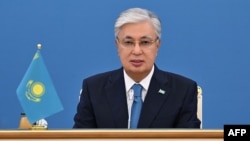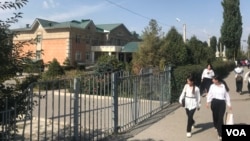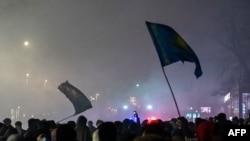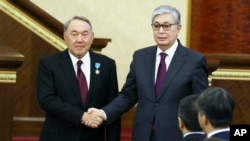Widespread hopes for a more pluralistic and democratic Kazakhstan are fading some 30 months after President Kassym-Jomart Tokayev unveiled his program for dismantling the authoritarian system associated with his predecessor and mentor, Nursultan Nazarbayev.
The “New Kazakhstan” program was greeted enthusiastically by political analysts and civil society members when it was announced in March 2022 to a country still reeling from violent nationwide protests two months earlier.
However, some of those same analysts and experts are now expressing disillusionment, saying New Kazakhstan has largely remained on paper while Nazarbayev and his relatives continue to wield influence.
Nazarbayev ruled over Kazakhstan for three decades after the collapse of the Soviet Union, turning the country into a vibrant regional economy while skillfully balancing relations with Russia, China and the West.
As his relatives and close business associates prospered, Nazarbayev crushed political opposition and promoted a cult of personality.
In 2010, the Kazakh Parliament declared him “Leader of the Nation,” a title that came with immunity from prosecution and a right to stay in power indefinitely. In 2019, Kazakh authorities changed the name of the capital city from Astana to Nur-Sultan in his honor.
In March 2019, Nazarbayev stepped down from the presidency and transferred power to his hand-picked successor, Tokayev, then serving as speaker of the Parliament. But he ensured that he would continue to hold real power as the head of the Security Council, a governmental body that oversaw Tokayev’s Cabinet.
Nazarbayev’s political fortunes changed abruptly in January 2022 when, amid violent street protests caused by a fuel price increase, Tokayev stripped him of his role as head of the Security Council and arrested his loyalists, including Karim Massimov, the head of the National Security Committee, on treason charges.
Nazarbayev’s relatives, meanwhile, were forced to relinquish high-ranking government positions.
The January 2022 protests “untied Tokayev’s hands,” said a Kazakhstani researcher who spoke to VOA on condition of anonymity for fear of official retribution.
“Previously, he had to obtain Nazarbayev’s approval for all major political decisions, which created a dual power situation in the country. This [arrangement] proved useful in the beginning but led to bloodshed in the end.”
In subsequent weeks and months, Tokayev presided over further efforts to weaken Nazarbayev, including a restoration of the capital’s name as Astana and a ruling by the Constitutional Court that annulled the law protecting Nazarbayev and his family from prosecution.
Kairat Satybaldy, Nazarbayev’s nephew, who had a reputation as an oligarch, was sentenced to six years in prison on embezzlement charges in September 2022. In January of this year, prosecutors charged another nephew, former deputy head of the National Security Committee Samat Abish, with abuse of office.
According to media reports, between 2022 and 2024, Kazakh investigators recouped $1.7 billion in what prosecutors said were “illegally appropriated assets” from Nazarbayev’s relatives and business associates.
Supporters of Tokayev remain enthusiastic about the reforms.
Mikhail Kazantsev, a member of the Parliament’s lower chamber, the Mazhilis, proclaimed in March of 2024 that "a new model has begun.”
“We had constitutional reform, the Parliament changed, the government became more dynamic, the president’s rhetoric has changed, and changes deepened,” he told Kazakh media.
Kazantsev added that Kazakh citizens had more freedom and the government had become more accountable.
But other experts and analysts now say that the political reforms and the dismantling of Nazarbayev’s legacy have stalled. In a March interview with Kazakh media, Dosym Satpayev, an Almaty-based political analyst, described Tokayev as “a mini-Nazarbayev.”
“Behind the facade of political advertisements, the essence of the system has not changed,” Satpayev said.
“Tokayev has not abolished the oligarchic system. People who surround him are not reformers, but those who made their careers under Nazarbayev. We are seeing the reincarnation of the Nazarbayev system under new slogans.”
In a September analysis published by Carnegie Endowment for International Peace, Kazakhstani analysts Aliya Tlegenova and Serik Beissembayev wrote that New Kazakhstan “increasingly looks like [the] old one."
“Tokayev has successfully consolidated power while the society fell into apathy caused by fear and disappointment,” they said.
In March, Abish was released from prison after receiving an eight-year suspended sentence. Then, in August, Kazakhstan’s Supreme Court refused to consider a corruption case against Nazarbayev, declaring that he still has immunity under Kazakh law.
Some experts see political expediency behind Tokayev’s lack of enthusiasm for a continued crackdown on Nazarbayev and his family.
The Kazakhstani researcher who spoke on condition of anonymity said Nazarbayev “has fostered an image of himself as the founding father of the nation. How can they [the ruling establishment] go after the founding father?”
The researcher added that Tokayev “does not want to be seen as an ungrateful person who turned against his mentor.”
In a July 2023 interview with Kazakh media, Joanna Lillis, a journalist based in Kazakhstan, said Tokayev “is still constrained in his actions. There is a likelihood of reaction from Nazarbayev and his people, even if they have been weakened.”
“Moreover, the Kazakh public has been told for three decades that Nazarbayev is a great leader who built a great country,” she said. “If this myth is busted, what will be left from three decades of independence? The problem is that this may create an ideological vacuum.”










